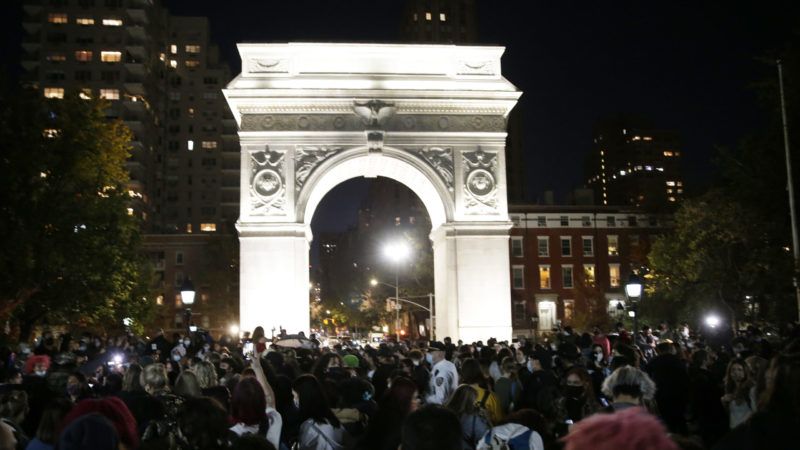Feeling Good About the Future After an Ugly Election
Amidst the anger and nastiness, there are real signs that America is thriving.

Is it wrong to feel good about a nasty, ugly, horrible election that isn't even officially over yet? I hope not, because I feel a hell of a lot better at the end of this week than at its start, when I looked at images of boarded-up buildings in cities from Los Angeles to New York, Seattle to Miami and pondered, for the first time in my long life, the possibility of Election Night rioting and street violence.
At virtually every level of contest, I'm happy to report that the results underscore just how out of step the two major parties are with the plurality of Americans who call ourselves independent. The Democrats were favored to win a solid majority in the Senate and expand their control of the House. They still might gain a razor-thin majority in the upper chamber early next year, when a couple of run-offs will be held, but the Dems lost seats in the House and liberals are still waiting for a "Blue Wave That Never Came." The race for the White House will take a while to fully suss out, but we know enough to conclude that apparent winner Joe Biden could barely eke out a victory against an opponent whose approval rating is a dozen points below the historical average. The upshot is that neither party can pretend it has a mandate, which just might mean people in Washington will trim their ambitions for the next few years.
As Robby Soave has noted, socialism didn't do well at the polls this year and its kissing cousin, wokeism, also fared poorly. Donald Trump "is on track to have the GOP's best showing among minorities in decades," notes Soave, an outcome that has driven some progressives absolutely nuts. New York Times columnist Charles M. Blow, for instance, responded with anger and incredulity that "the percentage of LGBT voting for Trump doubled from 2016" and that "the percentage of Latinos and Asians voting for Trump INCREASED from 2016, according to exit polls. Yet more evidence that we can't depend on the 'browning of America' to dismantle white supremacy and erase anti-blackness."
But it's a good thing that individuals cannot simply be defined by or reduced to their racial and ethnic identities, or their sexual orientation. And so it's good to see another Times Opinion section staffer, Isvett Verde, explicitly challenging crude identity politics:
The reason the "Latino vote" befuddles is because it doesn't exist, nor do "Latino issues." If we want to understand how Latinos vote, we should start by retiring the word "Latino" entirely — and maybe "Hispanic," too, a term first used by the United States government in the 1970 census that is based solely on the language native to the European settlers who conquered the Americas. These labels have served only to reduce us to a two-dimensional caricature: poor brown immigrants who always vote Democrat.
It's a better world when we're talking about people as individuals rather than undifferentiated masses. That's also true of behavior on the state level, too, where voters can also surprise. California is about the deepest blue state in the country, and its voters overwhelmingly picked Joe Biden over Donald Trump. Yet as former Reason Editor Virginia Postrel notes, "Democratic dominance doesn't mean that Californians endorse the hopes and dreams of the cultural and economic left. Results of Tuesday's many state ballot initiatives provide a more centrist picture." Among the good outcomes were resounding defeats of referenda that would have allowed rent control, added union-backed regulations to dialysis clinics, and forced "app-based delivery and ride-sharing companies to classify drivers as independent contractors." Proposition 16, which would have repealed a 24-year-old ban on affirmative action at public universities and state agencies, also got voted down, despite spending 20 times as much as the opposition. Perhaps the fact that minorities have thrived in California in the years since the ban on affirmative action passed in 1996 convinced voters that they no longer have to sanction such policies.
Then there was the clean sweep of various initiatives to legalize medical and recreational weed in Arizona, Mississippi, Montana, New Jersey, and South Dakota. Washington, D.C. voters, writes Reason's Regan Taylor, "opted by a margin of 3 to 1 to make the use, possession, and cultivation of entheogenic plants and fungi, such as psilocybin mushrooms, law enforcers' lowest priority." And Oregon, a state that has been in the news this year mostly for horrible wildfires and endless protests in Portland, passed initiatives to legalize psilocybin and to eliminate the possibility of jail time for possessing small amounts of narcotics including heroin and cocaine. This is bold stuff, and not because it simply allows more people to get high legally in different ways. "These actions by voters represent a long-overdue attempt to change the course of how we deal with adult-use of drugs and the problems of drug abuse in America," says Adrian Moore, a vice president of Reason Foundation, the nonprofit that publishes this website.
Who would have thought we'd be having an adult conversation about intoxicants in a year as awful as 2020 has been—and at the end of a horrible election season that really was the ugliest I can recall (perhaps not uncoincidentally, this election is breaking 100-year-old records for participation)? There are many horrible, horrible things all around us: lockdowns are continuing, the economy is in medically induced coma, most of federal spending continues whether Congress and the president lift a finger. But 2020's mixed election results show that we the people are pushing back and refusing to recite the scripts written for us.


Show Comments (196)